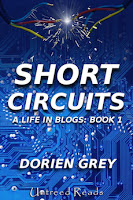I grew up during the time of the big-bands (Glenn Miller, Tommy Dorsey), patriotic war songs (I still get a lump in my throat hearing Kate Smith sing “God Bless America,” and “Stars & Stripes Forever” grabs me by the heart and hoists me into the air) and songs with intelligible lyrics that spoke to situations to which most people could relate.
I wasn’t exposed to much classical music at home, and am not sure how I first came across it, but when I got my first record player, in high school, the first record I bought was Stravinsky’s Rite of Spring, followed by Tchaikovsky’s Romeo and Juliet and Swan Lake. To me, Tchaikovsky was—and is—the epitome of musical power and unabashed romanticism. Definitely my kind of guy. That he was also gay didn’t hurt. In some strange way, I feel about his music the same way I and millions of other gays feel about with Judy Garland. They both had had it rough, but still gave you 200 percent of themselves: you never have to wonder where they’re coming from…they turned pain into pride, which is what gays and lesbians have been doing forever.
I’ve never been all that much into popular music, especially since about the time after Glenn Miller died. I like songs in which one can actually understand the words, and in which those words make some sort of sense. I honestly don’t think that my inability to appreciate the endless repetitions of “Yeah, yeah, baby, baby, baby” and stupefying idiocy should brand me as an antiquated fossil.
In classical music I vastly prefer orchestral over choral. I love it no-holds-barred, all-stops-pulled, and the fuller, the better. The overture to Wagner’s Tannhauser and the storm scene from Ferde Grofé’s Grand Canyon Suite are for me the absolute epitome of musical power: in both, the brass and deeper instruments stride powerfully forward while a goosebump-raising shimmer of strings cascades over them. If you doubt me, try listening to them.
I have never learned to appreciate opera, mainly because I can’t understand what they’re singing, and partly because the memorable parts are smothered in the non-memorable. If I can’t hum something after I hear it, I’m not interested. True, you can do that with a lot of opera, but again it’s like looking for the slice of pickle in a sub sandwich…you have to wade through too much other stuff to get to it.
I do hate stereotypes, but I have to admit a deep love of Broadway show tunes. In one of my books—The Angel Singers—the plot centers around a murder in a gay men’s chorus. As part of the story, I had to come up with a program for the chorus to sing and, when I asked a friend in the New York City Gay Men’s Chorus what he thought of it, he said they couldn’t have done better themselves, which delighted me no end.
Songs can encapsulate the human spirit, experience, and heart: the entire experience of being gay can be found in “I Am What I Am” from La Cage aux Folles, and “The Impossible Dream”; the power of its unity in “Consider Yourself” from Oliver and “Somewhere,” and “What I Did for Love” from A Chorus Line pretty much sums it all up.
Songs make me cry (“Memory” from Cats) or make me absolutely giddy with delight (“Consider Yourself” from Oliver) or overwhelm me with their sheer power (Edith Piaf’s “Je Ne Regrette Rien”; “The Battle Hymn of the Republic”).
What moves me most about music is its power to unite; to make us all feel part of something much larger than ourselves, to make us feel as though we belong: patriotic songs do this particularly well. Who can listen to “This is My Country” or “America the Beautiful” without being moved?
Unfortunately ninety-nine percent of “popular” music leaves me either totally puzzled or furious. I have listened (not through choice, you can be sure) to any number of “popular” songs any number of times without being able to understand a single word. I find it difficult to comprehend the rationale of those who defend much of today’s music. I’m not a prude, really I’m not. But with 250,000 words in the English language, does every other word have to be scatological, demeaning, or unintelligible? After 10,000 years of struggle to advance ourselves as a race, this is the best we can do?
Music is one of humanity’s greatest gifts. At its best, it can and should unite, comfort, and empower us by lifting us out of ourselves and remind us of our potential as a species. When it does not, it is simply noise.
-----------
This blog is from Dorien's ebook of blogs, Short Circuits, available from Untreed Reads and Amazon; it's also available as an audio book from Amazon/Audible.com:






No comments:
Post a Comment